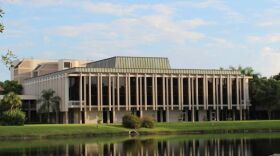Demonstrations in support of female empowerment took place in cities across the country this weekend, including marches in Sarasota and St. Petersburg, which attracted thousands at each.
On both days, many not only supported women's rights, but also denounced President Donald Trump's views on immigration, abortion, LGBT rights and women's rights on Saturday - the anniversary of his inauguration – and Sunday, the first anniversary of the massive wave of protest marches.
The Sarasota rally on Saturday attracted at least 7,000 people and served as a voter’s registration outreach event, according to the Sarasota Herald-Tribune. The midday rally Sunday in downtown St. Petersburg included more than 5,000 people, said organizers from the Women's March of the Central Gulf Coast of Florida.
Large rallies also took place in cities across Florida, including Miami, Jacksonville, Orlando and Palm Beach, home to the president’s Mar-a-Lago estate.

There, several hundred people gathered carrying anti-Trump signs before marching. A group of women wearing red cloaks and white hats like the characters in the book and TV show "The Handmaid's Tale" marched in formation, their heads bowed.
Cathy Muldoon, a high school librarian from Dallas, Pennsylvania, took her two teenage daughters to the New York rally and said marching gives people hope. She said this year's action is set against the backdrop of the Trump presidency, which "turned out to be as scary as we thought it would be."
"I've not seen any checks and balances," she said. "Everything is moving toward the right, and we have a president who seems to have no decency."
The 2017 rally in Washington, D.C., and hundreds of similar marches, created solidarity for those opposing Trump's views, words and actions. Millions of people around the world marched during last year's rallies.
Participants talked about the news avalanche of politics and gender issues in the past year. They said they were galvanized by the #MeToo movement, which has been credited as countering widespread sexual abuse and misconduct.
Critics of the weekend's marches said the demonstrations were really a protest against Trump.
Meanwhile, Trump on Saturday tweeted that it was a "perfect day" for women to march to celebrate the "economic success and wealth creation" that's happened during his first year in office.

"Get out there now to celebrate the historic milestones and unprecedented economic success and wealth creation that has taken place over the last 12 months," the Republican wrote. "Lowest female unemployment in 18 years!"
Demonstrators on Saturday denounced Trump's views with colorful signs and even saltier language.
Oklahoma City protesters chanted "We need a leader, not a creepy tweeter!" One woman donned a T-shirt with the likeness of social justice icon Woody Guthrie, who wrote "This Land Is Your Land."
Members of the group Missing and Murdered Indigenous Women of Seattle burned sage and chanted in front of Seattle's rainy march.
In Richmond, Virginia, the crowd burst into cheers when a woman ran down the middle of the street carrying a pink flag with the word "Resist."
The march in Washington, D.C., on Saturday took on the feel of a political rally when U.S. Sen. Kirsten Gillibrand and U.S. Rep. Nancy Pelosi, both Democrats, urged women to run for office and vote to oppose Trump and the Republicans' agenda.
"We march, we run, we vote, we win," Pelosi said, to applause.
People gathered from Montpelier to Milwaukee, from Shreveport to Seneca Falls.
"I think right now with the #MeToo movement, it's even more important to stand for our rights," said Karen Tordivo, who marched in Cleveland with her husband and 6-year-old daughter.
In Los Angeles, Eva Longoria, Natalie Portman, Viola Davis, Alfre Woodard, Scarlett Johansson, Constance Wu, Adam Scott and Rob Reiner were among the celebrities who addressed a crowd of hundreds of thousands of demonstrators at a women's march.
Longoria, who starred in TV's "Desperate Housewives," told marchers their presence matters, "especially when those in power seem to have turned their backs on reason and justice."
Portman, an Academy Award winner, talked about feeling sexualized by the entertainment industry from the time her first film, "Leon: The Professional," was released when she was 13 and suggested it's time for "a revolution of desire." In the 1994 film, Portman played a young girl taken in by a hit man after her family is killed.
Woodard urged everyone to register and vote, saying, "the 2018 midterms start now," echoing many speakers at marches across the country, who urged women to vote.
Copyright 2020 WUSF Public Media - WUSF 89.7. To see more, visit . 9(MDAyMTYyMTU5MDEyOTc4NzE4ODNmYWEwYQ004))











